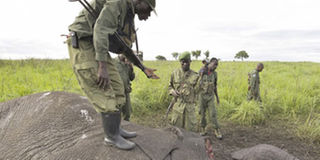Conservation evangelism will not save elephants from everlasting poaching

PHOTO | FILE Evidence of elephant poaching.
What you need to know:
- Although most KWS rangers are honest people who risk their lives protecting wild animals, the evangelists rarely acknowledge them
- More and more cash being donated to save Africa’s remaining populations of wildlife. Yet much of the cash is devoted to wildlife research projects
- Rather than work with KWS in dealing with well-heeled, gun-toting gangs of poachers, evangelists are walking all over the place “sensitizing” Kenyans
Time has come for us to ask whether the conservation philosophy and practice we have adopted since colonialism has been of any good to the wildlife.
For inordinately too long, the country’s wildlife conservation effort has been dominated by a long-running deception revolving around “conservation evangelism” that has silently kicked out other thought processes.
To those unaware, “conservation evangelism” revolves around creating fame for personalities who do little else to ensure wildlife is preserved into perpetuity.
Those involved are forever in the media talking about the good that they do. These are people who spend a good part of their lives chatting in the Internet, people who use every opportunity to tell all and sundry about the plight of animals and the immense impact that their non-tangible activities have had on saving the country’s wildlife.
If you wish to put faces to the lot, you will find them in hotels “work-shopping” or in air-conditioned halls “conferencing” about poaching or the latest approaches to conservation.
Occasionally, they tour New York, London, Berlin and many other western metropolises where they give copious talks about such topics as the virtues of saving the spotted hyena from native spears.
With statistics, images, maps, short films, gory images of dead jumbos and sound bites from victims of human-wildlife conflicts, conservation evangelists paint one gloomy scenario after another. They detail the wrongs and inherent inadequacies in the national wildlife body, KWS, or how poaching is linked to the rampant corruption in government.
RARELY ACKNOWLEDGED
Although most KWS rangers are honest people who risk their lives protecting wild animals, the evangelists rarely acknowledge them, as they lump the officers together with wildlife’s rotten apples.
To drive the point home about the good that they do, the evangelists are keen to table newspaper cutting in conferences. These are reports of such projects as a newly built cattle dip, a classroom, a bore hole or a community hall that usually have photographs of local representatives hand-in-hand with the relevant evangelist.
Such projects are meant to entice the local people to love the same beasts that might have maimed or killed their relatives or destroyed acres of their crops.
As such narrations go on, the audience, particularly in the West, is filled with shock and awe. Having lived all their lives in over-protected, comfortable neighbourhoods typical of the US and Europe, most in the audience cannot imagine how on earth a sane human being would lack love for “such beauties” as elephants and dikdiks.
The audiences are nevertheless encouraged; at least there are people out there doing something about it. To most who attend such talks, conservation evangelists might be the best thing that happened to wildlife in Africa.
Soon, purses open, particularly after the evangelist is through with analysing the “challenges” that they face as they try to make Kenyans love animals of the wild.
This narration is repeated year-in-year out, to different audiences across Europe and America. It is also repeated, albeit differently, to the local media while such internationally-acclaimed TV-channels like the National Geographic and BBC help to capture the imagination of the global animal-loving audience to the sheer beauty and plight of wild animals in Kenya and elsewhere in the continent.
This means more and more cash being donated to save Africa’s remaining populations of wildlife. Yet much of the cash is devoted to wildlife research projects — some of which have gone on for some 40 odd years!
IGNORED VOICES
Although the KWS — and by extension, the government — are the official custodian of the country’s wildlife, rarely are local scientists or senior wardens ever invited to articulate the real challenges facing Kenya’s grand conservation effort.
Ignored too are the voices of the local people who live with the animals. To the unsuspecting money men in US and elsewhere, the national conservation interests as well as the wishes of local people are adequately represented by conservation evangelists.
Of late, most evangelists are preoccupied with the anti-poaching campaigns. Rather than work with KWS in dealing with well-heeled, gun-toting gangs of poachers, they are walking all over the place “sensitizing” Kenyans.
John Mbaria writes on Environment Conservation ([email protected])




